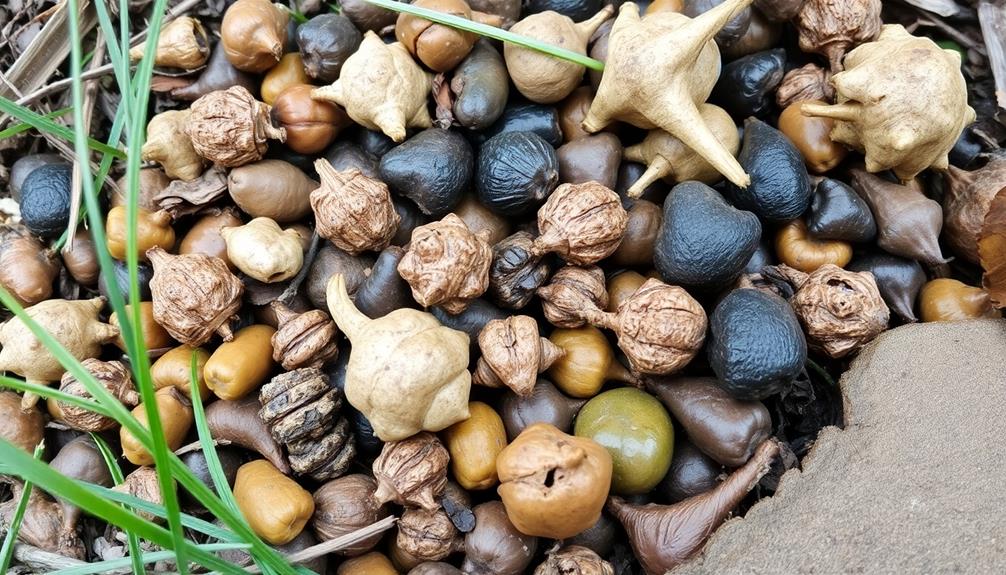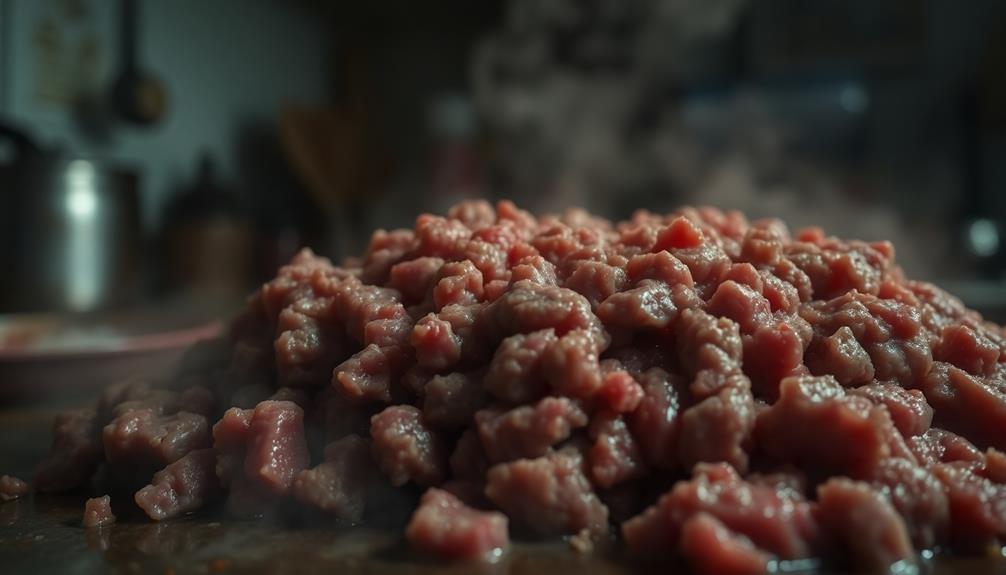Poop smells unique because it's mainly made up of bacteria breaking down food in your gut. Normally, you'll notice a mild, earthy odor. This smell can change based on what you've eaten. For example, foods high in protein or sulfur can make it stronger. If it smells particularly bad or different, it might indicate digestive issues, so it's wise to pay attention. Factors like hydration and even the bathroom setting can affect how it smells too. Curious about why these changes happen? Stick around to discover more about your body's signals and what they might mean!
Key Takeaways
- Normal poop typically has a mild, earthy odor due to bacteria and undigested food.
- Strong, foul-smelling poop may indicate gastrointestinal issues or malabsorption problems.
- High-protein and sulfur-rich foods can lead to more pungent stool odors.
- A sweet or fruity smell might suggest diabetes or malabsorption concerns.
- Changes in odor, especially with additional symptoms, should prompt medical evaluation.
Introduction

When you think about poop, the first thing that often comes to mind is its distinctive smell. This odor is strong and can be quite foul, thanks to the breakdown of food by gut bacteria during digestion. As your body processes what you eat, these bacteria produce volatile compounds that contribute to the unique smell of your poop.
Interestingly, the specific odor can change based on your diet. If you eat a lot of high-protein foods or cruciferous vegetables, you might notice a more pungent smell.
Sometimes, foul-smelling stools can signal gastrointestinal issues or malabsorption problems. When your body struggles to digest food properly, it can lead to abnormal bacteria or undigested food, which can change the typical odor.
Conditions like lactose intolerance or inflammatory bowel disease (IBD) can also result in particularly offensive smells due to inflammation in your intestines.
If you notice persistent changes in your stool odor, especially if it comes with other concerning symptoms, it's important to pay attention. Keeping track of these changes can be crucial for your health, so don't hesitate to seek medical advice if needed!
Description of the Smell

The smell of stool can vary significantly, influenced by factors like diet and digestion. Normally, stool has a mild odor due to bacteria and undigested food. However, certain changes in the odor may indicate underlying health issues. For instance, chronic foul-smelling stool can be a sign of malabsorption or infections. This raises the common question: *what does cancer poop smell like?* While there isn’t a specific “cancer smell,” some individuals with colorectal cancer report a noticeable change in stool odor due to altered digestion or the presence of blood in the stool.
However, if you notice foul-smelling stool, it can have distinct odors. For instance, an ammonia scent could suggest problems with protein digestion. A rotten egg smell often comes from sulfur-rich foods.
You might also encounter a metallic odor, which may indicate blood in the stool, pointing to underlying health issues like inflammatory bowel disease or hemorrhoids.
Your diet plays a big role too; a high-fat diet can create a strong, greasy smell known as steatorrhea.
If you experience persistent or unusually strong odors, it's important to pay attention. These smells can signal gastrointestinal disorders or malabsorption issues, meaning you might need a medical evaluation.
Keeping track of any symptoms you notice can be helpful when discussing your health with a doctor. Remember, the way your stool smells can provide clues about your digestion and overall health, so don't hesitate to seek advice if something seems off!
Source and Composition

Breaking down food in the intestines is where the smell of poop originates, shaped by both your diet and the bacteria in your gut. The odors you notice in smelly stool arise from various compounds produced during digestion. For instance, volatile fatty acids, ammonia, and sulfur-containing compounds are key players in creating that characteristic smell.
When your diet includes high levels of protein and fat, you're likely to notice stronger odors. These foods lead to increased ammonia production and other foul-smelling substances. If you eat a lot of sulfur-rich foods, like meat, fish, or cruciferous vegetables, you might catch a whiff of that rotten egg smell. That's due to the release of hydrogen sulfide gas.
Your gut bacteria also play a big role. A balanced gut can make poop smell more tolerable, while imbalances can create more pungent odors.
Dietary changes, like switching to healthier foods, can improve the situation. So, if you want to minimize unpleasant poop smells, consider how your diet affects your gut bacteria and the resulting gas and odors produced during digestion.
Typical Scenarios or Environments

In various settings, the smell of poop can hit you differently based on numerous factors. When you're in a private bathroom, you might notice that the odor isn't as strong compared to public restrooms.
In public restrooms, the strong smell can be amplified by multiple users and the types of cleaning products used. These places often have limited ventilation, which can trap odors and make them feel even more intense.
Your diet also plays a big role in how poop smells. If you eat foods high in sulfur, like meat or broccoli, the odor can become more pungent. On the flip side, a diet rich in fruits and vegetables may lead to a milder smell.
Sometimes, health issues can affect the odor too. If someone has gastrointestinal disorders or infections, their poop might've a particularly foul smell, indicating they need to see a doctor.
Environmental factors, like humidity, can further change how poop smells in different places. So, whether you're at home or using a public restroom, the smell of poop can tell you a lot about diet, health, and the environment around you!
Emotional or Cultural Associations

Evoking strong emotional reactions, the smell of poop often triggers disgust, a response deeply rooted in our instinct for health and safety. You might feel a wave of uncleanliness wash over you, and that's natural. Many cultures have strong associations with poop smell, linking it to health hazards and creating social stigmas. This can lead to discomfort in conversations about hygiene or sanitation.
However, it's interesting to note that some cultures use humor to tackle the taboo around poop smell. Jokes and funny stories can help lighten the mood and make the topic less awkward. In different societies, attitudes vary; the smell mightn't be offensive everywhere.
For instance, some cultures embrace rituals like composting human waste, turning something considered disgusting into a sustainable practice.
These cultural associations remind us that poop smell isn't just about disgust. It's tied to our views on health, cleanliness, and even sustainability.
Health or Safety Considerations

Monitoring your stool's odor can reveal important health insights. If you notice foul-smelling stool, it might point to underlying health issues in your digestive system. Infections, malabsorption syndromes, or gastrointestinal disorders could be at play, so a medical evaluation is wise if the smell lingers.
Your dietary choices can also affect stool odor. Foods high in sulfates, like meat and cruciferous vegetables, can lead to stronger smells as they change your gut bacteria. However, if you experience symptoms like abdominal pain, diarrhea with blood or mucus, fever, or unexplained weight loss, seek medical attention right away.
Taking antibiotics can disrupt your gut bacteria, causing temporary changes in stool odor. But if the foul smell doesn't go away, it could signal an overgrowth of harmful bacteria.
Keeping an eye on your stool characteristics, including its odor, helps with early detection of potential health conditions. This monitoring can prompt timely interventions and management strategies, making it easier for you to maintain your health and well-being.
Final Thoughts

Understanding the nuances of stool odor can be a key factor in maintaining your health. The way your stool smells can tell you a lot about what's happening in your digestive tract. If your stool smells particularly foul, it might signal underlying health issues like infections or malabsorption syndromes.
Foods you eat also play a big role; for example, diets high in sulfur, such as meat and certain vegetables, can lead to stronger odors that resemble rotten eggs.
It's important to pay attention to consistent changes in how your stool smells. If you notice unusually strong odors, especially when paired with other symptoms like diarrhea or blood in your stool, it's time to seek a medical evaluation. These foul-smelling stools could be a sign of gastrointestinal disorders that need attention.
Monitoring your dietary habits can help you understand the connection between what you eat and how your stool smells. This awareness can lead to early detection of potential health problems, making it easier for you to stay healthy.
Frequently Asked Questions
What Does Normal Poop Smell Like?
Normal poop smells mild and earthy, not overly offensive. You might notice variations based on what you've eaten. If you've consumed sulfur-rich foods, the odor could be stronger, but that's generally considered normal. However, if the odor becomes particularly foul, it could be a sign of an underlying issue. For example, *C. diff stool smell characteristics* are notably distinctive, often described as unusually pungent or sickly sweet, and may be an indication of a Clostridioides difficile infection. If you experience this along with other symptoms like diarrhea, it’s important to consult a healthcare provider.
Why Does Girl Poop Smell Different?
You might notice that your poop smells different due to hormonal changes, diet, or gut bacteria. Stress and dehydration can also play a role, affecting how intense or mild the odor becomes.
What Is in Poop That Makes It Smell?
When you digest food, bacteria break it down, producing gases and compounds that create odor. Sulfur, ammonia, and certain bacteria can intensify the smell, especially if your diet or health changes.
Why Is Poop Brown and Smelly?
Poop's brown color comes from bilirubin, a breakdown product of red blood cells. Its smell primarily arises from sulfur-containing compounds produced by bacteria during digestion, especially when you eat protein-rich or sulfur-heavy foods.









